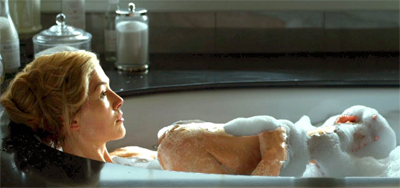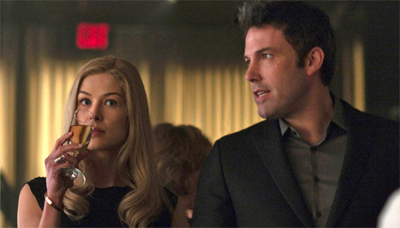The stories that people tell.
In many respects, Gone Girl is a story about narratives. It is a film about how we construct and manage our own narratives, and the narratives of those around us. Facts are malleable, reality is arbitrary. Everything that happens exists as a detail to be woven into some sort of story. Inevitably, stories differ, narratives conflict. The story that Nick Dunne tells about the disappearance of his wife differs from the version of events presented in her diary; the narrative that the public and the press construct is rather distinct from that constructed by those inside the story.
Gone Girl itself plays with this idea, playing with the audience. It starts out as a very familiar and almost cliché story. Nick Dunne was trapped in a loveless marriage. His wife disappears. People begin to suspect that perhaps Dunne had something to do in the disappearance. Even the audience isn’t entirely sure what to make of Nick as the details add up against him. The closer we look, the more flaws begin to appear, the more the evidence seems to mount.
And then, the story changes. Gone Girl pulls the rug out for underneath the audience, becoming something radically different and almost surreal. It’s a dazzling, brilliant, crazy, ambitious and ingenious. Gone Girl is a startlingly confident twisty film that plays with the audience with a macabre glee that is contagious.
The idea of stories recurs throughout Gone Girl. Both Nick and Amy Dunne are writers. Amy wrote magazine advice columns, while Nick Dunne wrote for men’s magazines. In both cases, they are writers who tend to embellish and manipulate real-life, offering readers an idealised narrative of life itself – promising to give a story a happy ending, or to impose structure on something as chaotic as day-to-day existence.
When both are made redundant during the recession, they remain writers – although they begin to write for one another. Nick casts Amy as the shrewish and controlling wife; at one point, he reflects that she tries to “stage-manage” him. In contrast, Amy tries to re-write Nick’s own life, to make him a better person, to change who he is. In both cases, Nick and Amy Dunne impose their own narrative on to reality.
Given that the film opens with Amy’s disappearance, the film spends considerable time pouring over her diary. It is very clearly and very consciously an attempt to structure her own life. She casts her first meeting with Nick Dunne as something of a romantic fairytale. They even kiss in the middle of a “sugar storm.” The film suggests that Amy’s narrative may not be entirely reliable, that her story may be a curious blend of reality and fiction – and that it certainly isn’t compatible with Nick’s vision of their narrative.
Then again, Amy has a lot of experience with this. Nick suggests that Amy’s childhood was “plagiarised” by her parents, who made millions off of a series of children’s books about a barely fictionalised “Amazing Amy.” Amy herself counters that her parents simply “improved” on her childhood, documenting their own idealised narrative of a young girl who managed to measure up to every one of their expectations. That this narrative did not match reality was incidental.
It is very hard to talk about Gone Girl without saying too much. There is a discussion to be had about spoiler culture, and how much it is appropriate to reveal in a review of a film. There is a legitimate argument to be made that revealing the very existence of a twist is a spoiler, something that puts the audience on-guard and impacts their enjoyment of the film. At the same time, there are films that it is impossible to discuss without alluding – in terms no matter how vague – to the twist.
Gone Girl is such a film. For its first hour, it is a very well-constructed mystery thriller. It is written in very broad terms, and Fincher’s direction is as stylish and confident as ever, but there is something fairly familiar about it. It is easy enough to check off the familiar plot elements as they arise. The marriage between Nick and Amy Dunne was under pressure. She was wealthier than he was. There are questions of infidelity. The police just need to find a body.
However, about an hour into the film, everything changes. It isn’t just a key plot reveal that changes the nature of the film – it’s very clear shift in tone and style. Gone Girl begins as one kind of story, before transitioning into another type of film. The threads – thematic and plot – carry over, but the emphasis changes. Gone Girl never stops being a tale of an unhappy marriage under pressure, it just transitions from Kramer vs. Kramer into War of the Roses.
It is a change that induces whiplash. It happens so quickly and so bluntly that it catches the audience off guard. We thought we knew what story this was, but then the film starts telling another story. It’s a fantastically clever and twisty set-up, but it is also a trick. This is cinematic sleight of hand. It is a brave shift, but it is one that relies on everybody involved to carry it off. Gone Girl is a film that relies very heavily on its director and its cast to carry it off.
It should be no surprise that David Fincher pulls it off. Gone Girl is a film that lives or dies by Fincher’s ability to bring the audience along, and his technically precise and somewhat detached style helps keep the distance necessary for Gone Girl to pull the big switcheroo. His handily of the early mystery elements is meticulous and stylish and careful enough to it works, but never so invested that the audience becomes too attached.
To be fair, there is a sense that this more of an exercise in form for Fincher. Gone Girl is a very clever narrative experiment, a fine showcase for the director’s talent and skill. In this respect, it feels almost like a more ambitious and accomplished companion piece to Fincher’s “lighter” films like The Girl With the Dragon Tattoo or The Game, rather than his more weighty or substantial work. Gone Girl is playful and well-constructed, but its nature as a story about stories – paired with Fincher’s clinical style – enforces a distance that makes it feel a little clinical in places.
Still, this is a minor complaint. Gone Girl is elevated by a fantastic ensemble. Ben Affleck is perfectly cast as Nick, the “so-charming-it-is-very-hard-not-to-hate-him” protagonist who seems perfect on paper but almost a little too perfect. Rosamund Pike is a revelation as Amy, the wife who quickly finds herself canonised by the media and public. There are some great supporting performances along the way, including a charming and knowing appearance from Tyler Perry, a predatory role for Sela Ward, and a delightfully off-balance supporting role for Neil Patrick Harris.
Gone Girl is a a story very much about stories. Everybody in the film has their own story, their own attempt to explain and impose order on the world around them. There is an art to managing and maintaining these stories, trying to control their own narratives. It’s a very clever, very wry, very surreal viewing experience, and one of the films of the year so far.
Filed under: Non-Review Reviews | Tagged: amazing amy, amy, ben affleck, david fincher, films, gone girl, Movies, nick dunne, non-review review, review, Rosamund Pike, twist |



























It’s certainly not Fincher’s best, but it’s still a whole heck of a lot of fun. Especially from a director who seemed like he sort of forgot what that word actually meant. Good review.
I don’t know, I kinda liked The Girl in the Dragon Tattoo as a pulpy serial killer thriller. And I think that Gone Girl is a bit heavier than Fincher’s other “fun” films like The Game. But you’re right, Gone Girl is downright playful in places – maliciously so, almost.
The Swedish version of Girl With Dragon Tattoo was IMO far superior to Fincher’s directorial style. Social Network was flawless. I wish he had done DeLillo’s Cosmopolis instead of Cronenberg. In GG he gets all the scenes from the book without the nuances of the book. He could have with the actors he chose but didn’t leave them room enough to do that.
As for GG it is a steal from Joyce Carol Oates’s recent novel Carthage. When asked about her literary influences Flynn adds JCO last and says no more.And that’s all I could get from google. But Carthage, with some inversions, is the story and a far better written and seen one. Add Oates’s Mudwoman and The Grave Digger’s Daughter and you pretty much have it all by a major writer and professor at Princeton. Flynn worked at Entretainment Weekly for 10 years and “loved being paid to see movies, read books and write about them” but was laid off in 09 or thereabouts. GG sounds like an EW style but is exceptionally good as Amy takes on the persona of Cool Girl, which is tiqqun’s Young-Girl fictionalized consciously by Amy. I just wonder why she didn’t acknowledge Oates out loud.It seems no one but me has picked it up and Carthage is also in upstate New York which is the setting for many of Oates’s novels and where she came from.The name of the town even the same, the man going to……..and so many more scenes it feels the same.
Great film, great performances, soul crushing last act.
I’m glad I watched it but very upset having watched it.
Yep. Fantastic film. And it is downright malicious in how it treats the audience – a nice reflection of the marriage at the film’s core, perhaps?
Interesting read. My thoughts were different, I really didn’t like it, but you’ve given me another point of view to consider.
Thanks dude!
Nice review!!! Yes, it’s an exercise in form for Fincher and a very successful one at that.
Here are my thoughts on the movie:
Gone Girl comes across as a typical crime mystery-cum-thriller that involves search for a missing person, but, in essence, it’s a satire on: the lack of fidelity in modern marriages, the ever increasing influence of media on public opinion and how it invariably curbs personal privacy, and the drastic impact of economic changes on the quality of human relationships.
Gone Girl is quite high on entertainment quotient, and, at the same time, it offers some good fodder to ruminate upon.
My full review can be read here:
http://www.apotpourriofvestiges.com/2014/11/gone-girl-2014-david-finchers-satire-on.html
Thanks. It is a very well-constructed film.